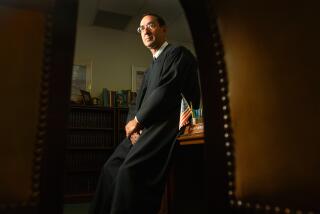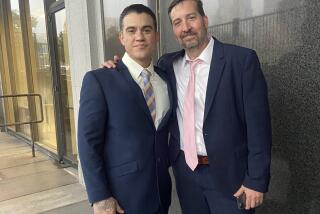Jury Misconduct Nullifies DeHoyos’ Murder Verdict
SANTA ANA — A Superior Court judge, acknowledging that his ruling was “likely to cause extreme community revulsion,” cited jury misconduct Thursday as he threw out the murder conviction and death-penalty verdict of a confessed child killer.
Richard Lucio DeHoyos, a 34-year-old drifter from Texas, was convicted last October of kidnaping, sexually assaulting and killing a fourth-grader as she was on her way home from school in Santa Ana. The same jury also decided that DeHoyos was sane at the time he killed 9-year-old Nadia Puente on March 20, 1989, and recommended that he be sentenced to death.
“Even guilty persons are entitled to a fair trial,” and the presence of biased jurors “tears at the very fabric of the judicial process,” Judge Everett W. Dickey said.
If Dickey’s ruling is not overturned, DeHoyos will be retried, probably in the fall. DeHoyos will remain in custody.
As Dickey announced his decision, the girl’s mother, Sara Puente, began moaning and weeping, and had to be revived with smelling salts.
Dickey ruled that the jury forewoman, Vicki A. King of Orange, had acted improperly during the trial and later lied about her role when questioned by the judge. Dickey said that at least two other jurors also acted improperly, together with a fourth person who had been excused from serving on the jury.
King, Dickey said, had concealed a longstanding “social relationship” with a prosecutor both in a written questionnaire and during jury selection.
King could not be reached for comment Thursday.
Later during the trial, King and two other jurors had lunch with another woman who had been examined but not selected for the jury. At that lunch, the excused juror showed the others several newspaper articles about DeHoyos’ defense attorney, Milton C. Grimes.
Dickey said the articles detailed Grimes’ role in two other high-profile murder trials. In each case, Grimes focused on the mental state of the defendants, one of whom faced the death penalty. The three DeHoyos jurors later discussed the contents of the articles with others in the jury room, Dickey found.
Dickey said that while the evidence that DeHoyos asphyxiated the Puente girl in a Santa Ana motel room and dumped her body in Griffith Park in Los Angeles was “overwhelming,” his state of mind at the time was central to his defense.
DeHoyos’ attorneys argued that the defendant suffered from organic brain damage and other mental illnesses that affected him the day of the killing.
Deputy Dist. Atty. Robert C. Gannon Jr. said he disagreed with the judge’s decision and that his office would review the trial transcript to determine whether to appeal Dickey’s ruling.
More to Read
Sign up for Essential California
The most important California stories and recommendations in your inbox every morning.
You may occasionally receive promotional content from the Los Angeles Times.










